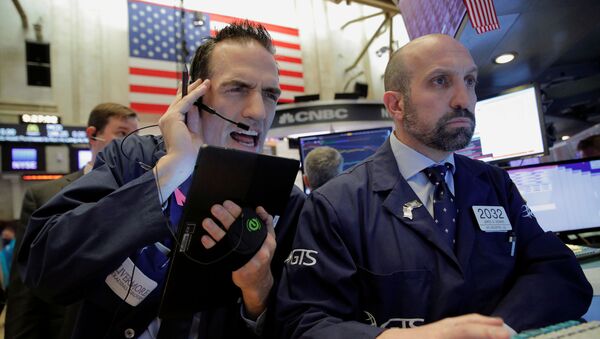Moments after the stocks markets opened, trading on Wall Street's three main indexes was suspended, setting off an automatic 15-minute cutout for the second time this week.
At 9:35 a.m. ET (13:35 GMT), the Dow Jones Industrial Average was down 1,696.31 points, or 7.20%, at 21,856.91, while the S&P 500 was down 192.33 points, or 7.02%, at 2,549.05, and the Nasdaq Composite was down 558.80 points, or 7.03%, at 7,393.25.
All three indexes are down more than 20 percent from their most recent highs in February, denoting bear markets.
Trading resumed after stopping for 15 minutes, with the main indexes having dropped 8-9%.
All three main indexes have now dropped over 24% from their intraday record highs hit in February.
European Indexes Fall by More Than 10%
Major European stock indexes fell by more than 10% after the last meeting of the European Central Bank and its decision to keep rates at the current level, trading data shows.
As of 13:45 GMT, the British FTSE 100 index had fallen by 9.47% to 5,319.95 points, the French CAC 40 had dropped by 11.24%, to 4,091.96 points, and Germany’s DAX had fallen by 10.76%, to 9,315.2 points.
Markets also drew attention to statements by ECB President Christine Lagarde that the coronavirus will have a significant impact on economic activity in Europe.
Situation on Russia’s Stock Markets
Meanwhile, the Russian stock market has intensified its fall, following the oil market, and is already trading at below 2,300 points on the Moscow Exchange (MOEX) index, according to trading data.
By 16:39 Moscow time (13:39 GMT), the Moscow Stock Exchange Index had fallen by 8.2 percent to 2,290 points, while the RTS Index fell by 11.8 percent, to 958 points.
Brent oil is down 9.1 percent to $32.54 a barrel.
Russia’s stock markets plunged upon opening on 12 March on the back of the World Health Organisation declaring a pandemic, with the Moscow Exchange falling below 2,400 for the first time since January 2019 and the Russia Trading System index dropping below 1,000 points for the first time since July 2017.
However, low oil prices and the fall of the ruble are not only creating risks, but new opportunities for the Russian economy, Prime Minister Mikhail Mishustin said earlier in the day, adding that the government was preparing additional measures to deepen import substitution in several sectors.
Gold Prices
The price of gold has dropped by more than 3%, along with sales on world stock and commodity markets, according to trading data.
As of 16:49 Moscow time (13:49 GMT), April gold futures on COMEX were down 3.28 percent, or $53.7, to $1,588.25 per troy ounce. May COMEX silver prices fell by 4.8% to $15.97 an ounce.
Stock markets around the world tumbled on 9 March amid fears over the coronavirus disease, officially named COVID-19, and a fall in global oil prices after the OPEC+ deal collapsed.



